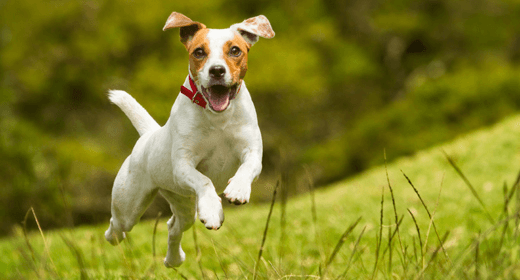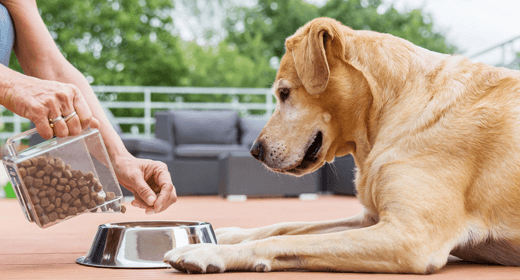

Dogs are creatures of habit and can resist change when trying to switch their diets. It's important to completely stop feeding from the table. This is best accomplished by removing the pet from the kitchen during mealtimes. Be persistent when offering dry food. The pet may refuse to eat for several meals before deciding to give the food a try. Heating food in the microwave increases the aroma of the food and will often entice a pet to eat. Another alternative is to try mixing some wet food with the dry food, or topping it with a sauce or gravy specifically formulated for pets. Be assured that the pet eats to meet an energy need and will eventually begin to eat unless there is an underlying medical issue.
Keep in mind that the pet's stool should be small and firm. Most cases of constipation are temporary and due to dietary interruptions. Loose stools also are often temporary and can be due to dietary interruptions, as well as many other things, including an abrupt change in diet, overeating, parasites, medication, eating table scraps, viral or bacterial infections, and stress. If constipation or diarrhea persists, however, it is important to consult a veterinarian.
No. Dead grass is caused by a heavy concentration of urine—usually when a dog urinates in the same spot over and over. Try to train the dog to go to a designated, inconspicuous area of the yard. If this is impossible, try to hose the area as quickly as possible to dilute the urine. Sometimes the discoloration is due to acidic ground pH, which can usually be remedied with a lime treatment.


Dog-food products described as light, lite, or low calorie must meet specific calorie levels set by the Association of American Feed Control Officials (AAFCO), while dog foods named “less” or “reduced calorie” must show a percent reduction in calories as compared to a product in the same moisture-content category. The following table shows the guidelines as set by AAFCO for both dog and cat foods for determining whether a product can use the term “light.”
| Food Texture | Moisture Content | Dog Foods Maximum kcal ME/kg | Cat Foods Maximum kcalME/kg |
|---|---|---|---|
| Dry | less than 20% moisture | 3,100 | 3,250 |
| Semi-Moist | between 20 and 64% moisture | 2,500 | 2,650 |
| Canned | 65% or more moisture | 900 | 950 |
Like light versus reduced-calorie foods, lean or low-fat dog-food products must meet specific fat levels set by AAFCO, and less-fat or reduced-fat dog-food products need to show a percent reduction in fat as compared to a product in the same moisture category. AAFCO guidelines for dog and cat foods with “lean,” “low fat,” or similar words are shown in the following table.
| Food Texture | Moisture Content | Dog Foods Maximum % Crude Fat | Cat Foods Maximum % Crude Fat |
|---|---|---|---|
| Dry | less than 20% moisture | 9 | 10 |
| Semi-Moist | between 20 and 64% moisture | 7 | 8 |
| Canned | 65% or more moisture | 4 | 5 |